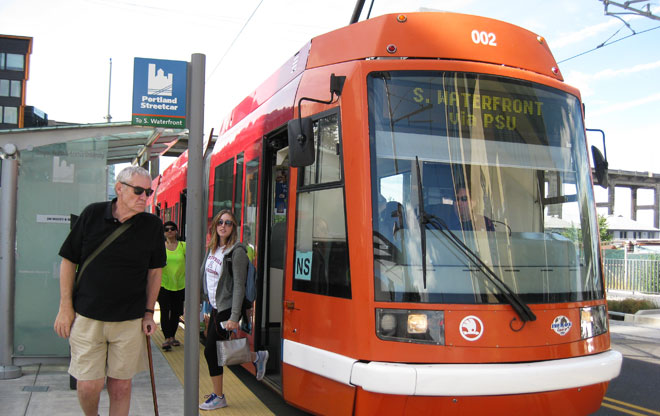
Go By Streetcar
Start your tour by riding the Portland Streetcar North/South (NS) line to South Waterfront and get off at SW Moody and Gibbs. In 2006 and 2007, the city extended streetcar into South Waterfront to support the city’s redevelopment strategy, which aims for 12,000 jobs and 6,000 housing units in the district. In addition to streetcar service, the district displays a range of sustainable transportation choices that includes bus, cycling, walking, and aerial tram. The region’s light rail system joins the mix in September 2015 when the new MAX orange line opens.
Image: Jean Senechal Biggs 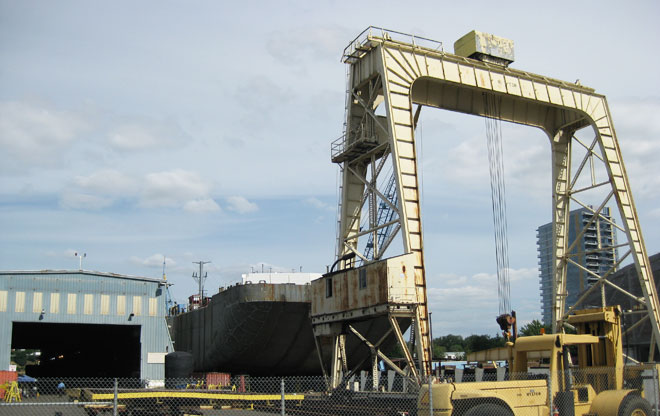
Working Waterfront
Former industrial operations left a large portion of the 120-acre South Waterfront vacant. Today, barge building happens just a few doors down from research at Oregon Health & Science University’s Center for Health & Healing. This 400,000-square-foot building opened in 2006 and is connected to the university’s Marquam Hill Campus by the Portland Aerial Tram. By January 2014, the tram had provided 10 million rides between the two campuses, eliminating 2 million vehicle miles and saving an estimated 93,000 gallons of gasoline.
Image: Jean Senechal Biggs 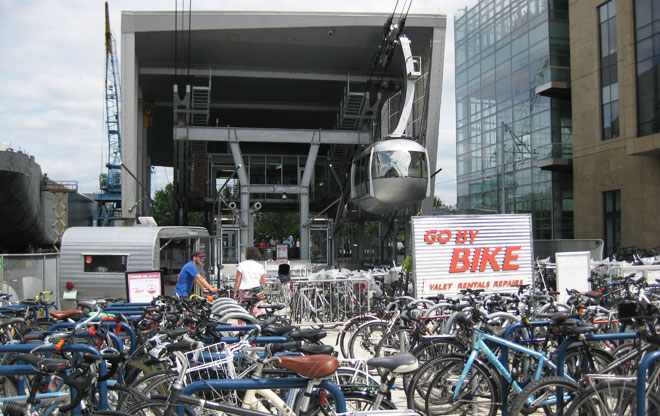
A Sea of Bicycles
Many cyclists who work on OHSU’s Marquam Hill Campus ride to South Waterfront, park their bike, and then take the tram up the hill. But when the tram first opened, there were few bike racks available and the demand for bike parking continued to grow. The SW Moody Avenue project transformed the Portland Aerial Tram’s lower terminal at Gibbs Street with a paved plaza that now is home to Go By Bike, the largest, free bike-parking valet service in America. By summer 2014, daily use of the valet service had grown to nearly 300 bikes per day.
Image: Jean Senechal Biggs 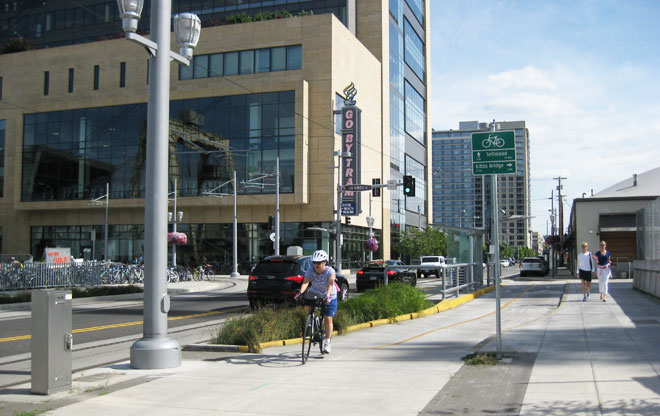
SW Moody Sidewalks and Cycle Track
Improved bike and pedestrian facilities in South Waterfront have improved access for all ages and abilities. Along the west side of SW Moody Avenue, the sidewalk is shared by cyclists and pedestrians, each with their own delineated space. A two-way bicycle path on the sidewalk, called a cycle track, provides a low-stress route away from vehicle traffic for cyclists to access the district. Signage informs cyclists about the time it takes to ride to destinations near and far.
Image: Jean Senechal Biggs 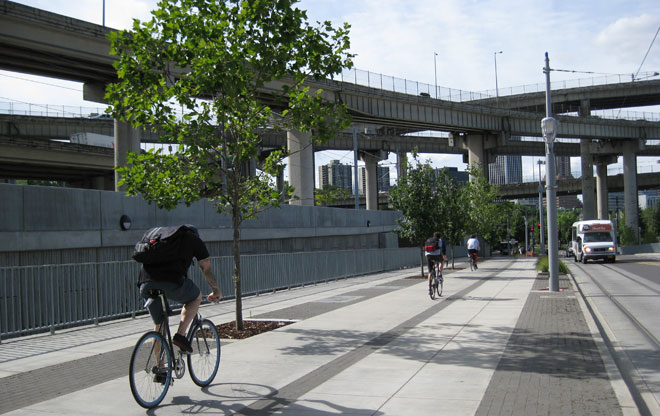
Sharing Space
Since it opened, the cycle track has been the primary connection for cyclists to get in and out of South Waterfront. Pavers placed in the sidewalk and a row of street trees divide up the space to indicate where northbound and southbound cyclists should ride and where pedestrians can walk.
Image: Jean Senechal Biggs 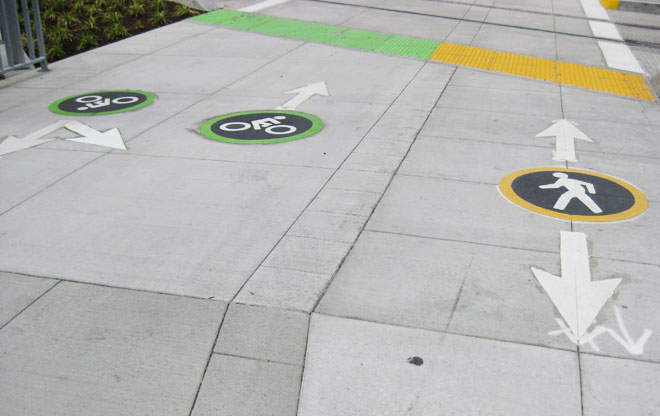
Pavement Markings for Bikes and Pedestrians
Space for cyclists and pedestrians is delineated at major intersections with the use of symbols and tactile warning devices on the pavement. Green has become the new standard color to help cyclists navigate Portland streets and alert motorists to the presence of bikes. The Portland Bureau of Transportation has pioneered the use of green in developing new pavement markings to increase safety for cyclists. As a member of the National Association of City Transportation Officials (NACTO), the City of Portland helped develop the NACTO Urban Bikeway Design Guide.
Image: Jean Senechal Biggs 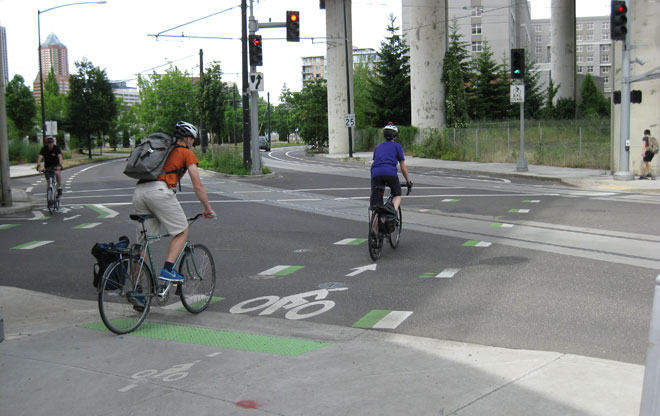
Bike Signal at SW Sheridan Street
At the north end of the cycle track, bikes have to merge back onto SW Moody Avenue to continue north into downtown. A bike signal at SW Sheridan Street stops vehicle traffic in all directions so that cyclists can cross the intersection diagonally. Detection loops imbedded in the concrete are designed to sense the presence of bikes and a symbol on sidewalk indicates where cyclists should wait in order for the signal to turn green. Bike signals are one of many tools used in Portland to help create streets that are safe and comfortable for bicycling.
Image: Jean Senechal Biggs 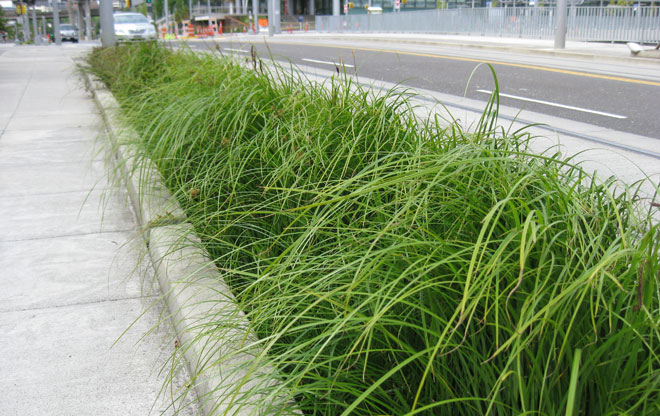
Managing Stormwater Sustainably
Green street facilities along the curb capture stormwater runoff. Plants and soil filter out dirt, oil, and other roadway pollutants before the water enters the sewer system. For well over a decade, Portland has been an innovator in building "green streets" throughout the transportation system on residential streets, neighborhood main streets, and major arterials to manage stormwater and improve watershed health.
Image: Jean Senechal Biggs 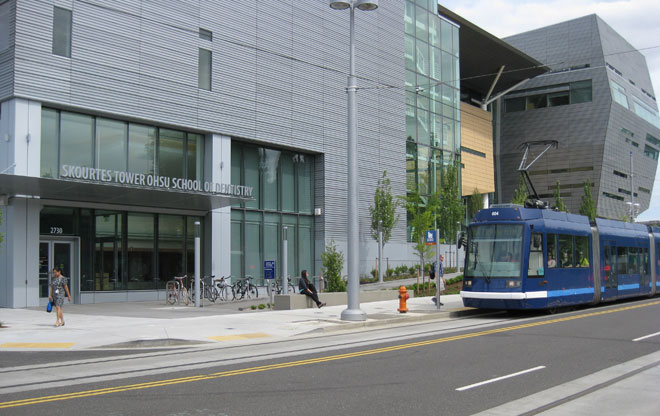
Road Improvements Lead to New Development
In summer 2014, the Oregon University System opened the new Collaborative Life Sciences Building, the first building to rise in OHSU’s Schnitzer Campus in South Waterfront. Construction of this building relied on the timely completion of the SW Moody Avenue improvements. The roadway was raised 14 feet above the original grade to avoid the contaminated soils below, making the adjacent parcels available for redevelopment. The new building’s entrance meets the street and Portland Streetcar serves riders right outside its front door.
Image: Jean Senechal Biggs